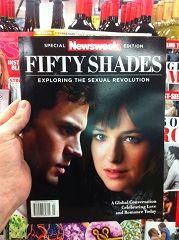While walking through CVS the other day, I passed by the magazine rack on my way to the pharmacy. I don't really read magazines, so I've made a habit of glancing at their covers while in convenience stores, sort of dipping my toe into the pop-culture waters to test their temperature. Normally it's more of the same. Cosmo hawking insecurity and desperation in equal measure. Hobby mags slinging superlatives. EW trumpeting the next blockbuster. Newsweek having a Very Serious Discussion about consensual sexual violence.
Wait, what the ...?!
Yes, a double take revealed that Newsweek had devoted a special issue, which is usually reserved for human health, global ecology, and great historical figures, to the celluloid version of Fifty Shades of Grey. That cover got me thinking not about BDSM, a topic of which I have about as much knowledge as interest (which is to say none), but about entertainment's influence on culture. Following are some thoughts on the matter in no particular order of importance.
First, it's never just a story. Back when The Magazine wrote my paychecks, I spent my days analyzing movie content. Detailing themes. Describing violence. Counting profanities. That sort of thing. Interestingly, plenty of people got irked when they learned what I did for a living. "Lighten up!" they'd say. "It's just a story." Only it's really not. Narratives necessarily incarnate truth claims, put fictional flesh on assertions about the nature of reality. Upon meeting Harriet Beecher Stowe, Abraham Lincoln allegedly said, "So you're the little woman who wrote the book that started this great war." Uncle Tom's Cabin made the subject of slavery a national conversation. Fifty Shades of Grey turned spankings and riding crops into water-cooler talk.
Second, you don't own your art. Longtime ISLF readers might do their own double take upon seeing the above header. After all, I've repeatedly defended the idea that authorial intent is the sun around which interpretation ought to orbit. I still believe it. But application is something else entirely. No author can control how an audience receives his work -- or what it does with it. Fifty Shades of Grey started out as Twilight fanfic, a sexed-up riff on an LDS housewife's supernatural tribute to abstinence. More than a little ironic, eh?
Third, enjoyment immunizes against elites. Arbiters of critical influence, popular taste, and moral authority all agree: Fifty Shades of Grey stinks to high heaven. It's poorly written. It's morally objectionable. It's socially injurious. It's really not sexy at all (content warning). And none of that matters. The book is the fastest-selling paperback ever. Even if they know they shouldn't, readers like what they like -- the consequences be hanged.
(Picture: Copyright 2015 by Loren Eaton)
Monday, February 2, 2015
Subscribe to:
Post Comments (Atom)



No comments:
Post a Comment